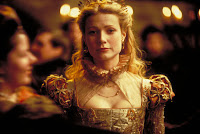...so, where was I?
The 5yr old, after getting a shortened form of Macbeth, wants the one about the king who divides his kingdom up among his daughters. Here we go!
Once upon a time there was a king, who had gotten so old and tired that he didn't want to be king anymore. He decided to split his kingdom into three parts and give each part to one of his daughters. So he called them all together and said, "Tell me how much you love me. Whoever loves me the most gets the best part of my kingdom."
Well, the first daughter got up and said "I love you *thhiisssss* much, and I love no one else but you." The king was pleased by this and gave her a share of the kingdom.
The second daughter got up and said, "Forget her, *I* love you *TTTTHHHIISSSS* much, and I, too, love no one else but you." The king was again very pleased, and gave the second daughter her share.
He then turned to his third daughter, the youngest, and said, "And now let's hear the best of all, because you are our favorite and we know that you love us the most of all."
"No, father," she told him. "I love you very very much, but I will not lie to you and tell you that I only love you, because when I get married I will love my husband, and when we have children I will love them too."
Well, her father the king was not happy with this answer at all. He got so mad that he said she would not have any share of the kingdom, and he banished her.
...at this point a choked little voice asks me, "But did he still love her?" And I am caught so by surprise that I don't quite know what to do with myself. My little guy has been hanging on every word, and he's an emphathetic little bugger.
"Oh, he absolutely still loved her," I told him, "He was just really really mad because he thought she was saying that she didn't love him. He didn't understand her answer. Are you sad?"
He nods, unable to get any words out.
I squeeze him a bit tighter and remind him that this story has a happy ending, remember? "We're going to find out that she loved him most of all."
So, the story continues. The king wanted to go live in the castle of the first daughter, but he wanted to have 100 soldiers with him just like any king should. But the soldiers ate all the food in the castle and made a big mess and didn't pick up after themselves...
Again, I am stopped. "Why didn't they pick up after themselves?"
"Well, soldiers can be pretty rowdy, and they really didn't listen to anybody. The king wasn't the king anymore, so they didn't think they had to do what he said."
He thought about this. "If I had 100 soldiers and I told them to pick up after themselves, would they listen to me?"
I assured him that absolutely, his soldiers would listen to him.
So, anyway, the first daughter told him that if he wanted to live there, he couldn't have his soldiers. So the king decided that he would go live with the second daughter. But, alas, the second daughter agreed with the first and said that no, he could not have his soldiers with him there, either.
So the king, who was very old and starting to get really sick, said that he would live alone and went out into the forest in the really bad rain. His remaining friends, Fool and Kent and Edgar, who were the most loyal of all, went out with him to protect him.
But remember the third daughter? The one who was banished when the king got mad at her for not saying she loved him the most of all? That daughter had gone out and formed an army of her own. And with her army she came charging back into the kingdom to do battle with the two evil sisters. She beat them, took the kingdom back, and rescued her father from the forest and told him that he could come and live with her forever with as many soldiers as he wanted. Because she really was the one that loved him the most of all.
And they all lived happily ever after.
"Were the other sisters allowed to come visit too?" asked my little empathetic guy, who didn't want to see anybody's feelings hurt.
"Oh, absolutely," I told him. "Once the third daughter came back and said that the king could live with her, everything was forgiven and they were all happy again."
He's probably going to hate me when he gets older and learns the real story, but if you'd heard his little voice crack over concern whether Lear still loved Cordelia, it would break your heart.
 1) Whenever I think of this movie I think of the whole Academy Award thing. So I want you to add a comment to this post inventing a "Shakespeare Award" category and nominating a play. Who had the best sword fight? Best Soliloquoy? Best supporting actor in a non-comedic role? Hopefully you get the idea. Best Cross-Dressing?
1) Whenever I think of this movie I think of the whole Academy Award thing. So I want you to add a comment to this post inventing a "Shakespeare Award" category and nominating a play. Who had the best sword fight? Best Soliloquoy? Best supporting actor in a non-comedic role? Hopefully you get the idea. Best Cross-Dressing?




